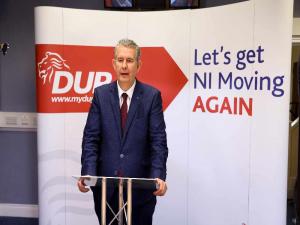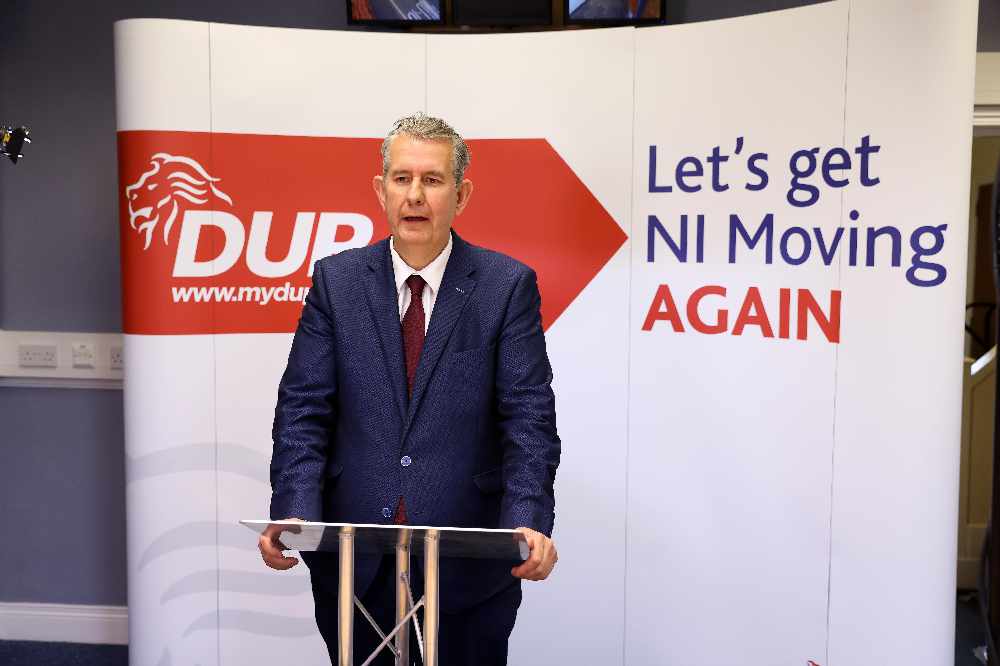
By Rebecca Black and David Young, PA
DUP leader Edwin Poots has said the time for talking about “Protocol problems” is over and has called for action.
Speaking after a meeting of the joint UK/EU committee on the implementation of the Protocol, he said the Northern Ireland Protocol should be scrapped.
Speaking after the same meeting, deputy First Minister Michelle O’Neill challenged the UK Government to “honour its commitments” on the Protocol.
She said progress had been made in some areas during the meeting, including on the supply of medicines from Great Britain, but there was “still a way to go” on other sticking points.
The DUP do not speak for the majority of citizens in the North, I made this very clear today in the meeting with the EU Commission & British Government.
— Michelle O’Neill (@moneillsf) June 9, 2021
The Protocol offers stability, certainty & real opportunities to local businesses with access to both the EU & British markets pic.twitter.com/GV9reLqz81
“I think certainly we’re probably at a crossroads point, I think that was certainly the indication from the EU side,” she told a Stormont press conference.
“Certainly there’s a frustration that the British Government have signed up to this agreement, however they have failed to bring forward ways to implement the Protocol in its entirety.”
However, outgoing First Minister Arlene Foster described the meeting as “hugely predictable from the EU side”.
“The Withdrawal agreement joint committee mtg today was hugely predictable from EU side – legal purism without any sense of proportionality or levels of risk,” she tweeted.
“Glad @DavidGHFrost set out the issues and possible solutions in detail.”
In a statement, Mr Poots said more talking is “not what Northern Ireland needs”.
“We need the NI Protocol to be removed,” he said.

“The Protocol has been a disaster both politically and economically.
“The Protocol was foisted on Northern Ireland against our will and means there are two-and-a-half times more checks at our ports than at Rotterdam, one of the world’s largest ports.
“It has resulted in 15,000 checks per week, meanwhile we have neither the infrastructure nor staff to meet the EU’s demands.
“The Protocol has failed and has only delivered instability and higher prices for Northern Ireland.
“It is time to remove the internal UK barriers rather than talking about the outworkings of those barriers.”
Mr Poots is set to meet European Commission vice-president Maros Sefcovic next week.
He added: “If Brussels is deaf to the problems, then our own government must act unilaterally to protect Northern Ireland.”
The Withdrawal agreement joint committee mtg today was hugely predictable from EU side - legal purism without any sense of proportionality or levels of risk. Glad @DavidGHFrost set out the issues and possible solutions in detail. #TeamUK
— Arlene Foster #WeWillMeetAgain (@ArleneFosterUK) June 9, 2021
Demonstrations against the Protocol by loyalists have been ongoing, with several hundred attending an event in Portadown at the weekend.
The pro-Union community in Northern Ireland oppose the Protocol and the checks on goods arriving into ports as having created a border between the region and the rest of the UK.
The Sinn Fein vice president said she made it clear that not everyone in Northern Ireland believes the Protocol should be scrapped.
“I took the opportunity at the meeting to address head-on with the EU Commission and indeed with David Frost that the Protocol has afforded opportunity, it does afford protection to the local business community here but it certainly affords opportunity in that we have access to both the British market and the EU market,” she added.
Meanwhile Aodhan Connolly, director of the Northern Ireland Retail Consortium, expressed disappointment at the lack of substantial progress.
He warned the clock is “counting down fast” for Northern Ireland consumers.
“We need immediate solutions to keep goods flowing now and we need a breathing space so that the UK Government and the EU can, in the longer term, find a workable solution that allows NI retailers to continue to give households the choice and affordability they need,” he said.
“This requires pragmatic controls which satisfy the EU’s concerns, recognises the deeply integrated GB-NI supply chains and can be introduced in a workable manner over a sensible time frame.
“The solutions are there. What we need now is the political will on both sides to see them delivered.”


 Bikers to descend on Westminster for veterans protest against Legacy Act repeal
Bikers to descend on Westminster for veterans protest against Legacy Act repeal
 Guidance sought over future of colourful parakeets in Belfast park
Guidance sought over future of colourful parakeets in Belfast park
 Woman released after questioning over pipe bombs in Co Down
Woman released after questioning over pipe bombs in Co Down
 Suspended chief constable will not be prosecuted over alleged sexual offences
Suspended chief constable will not be prosecuted over alleged sexual offences
 MI5 files not deliberately withheld from Stakeknife probe, review concludes
MI5 files not deliberately withheld from Stakeknife probe, review concludes